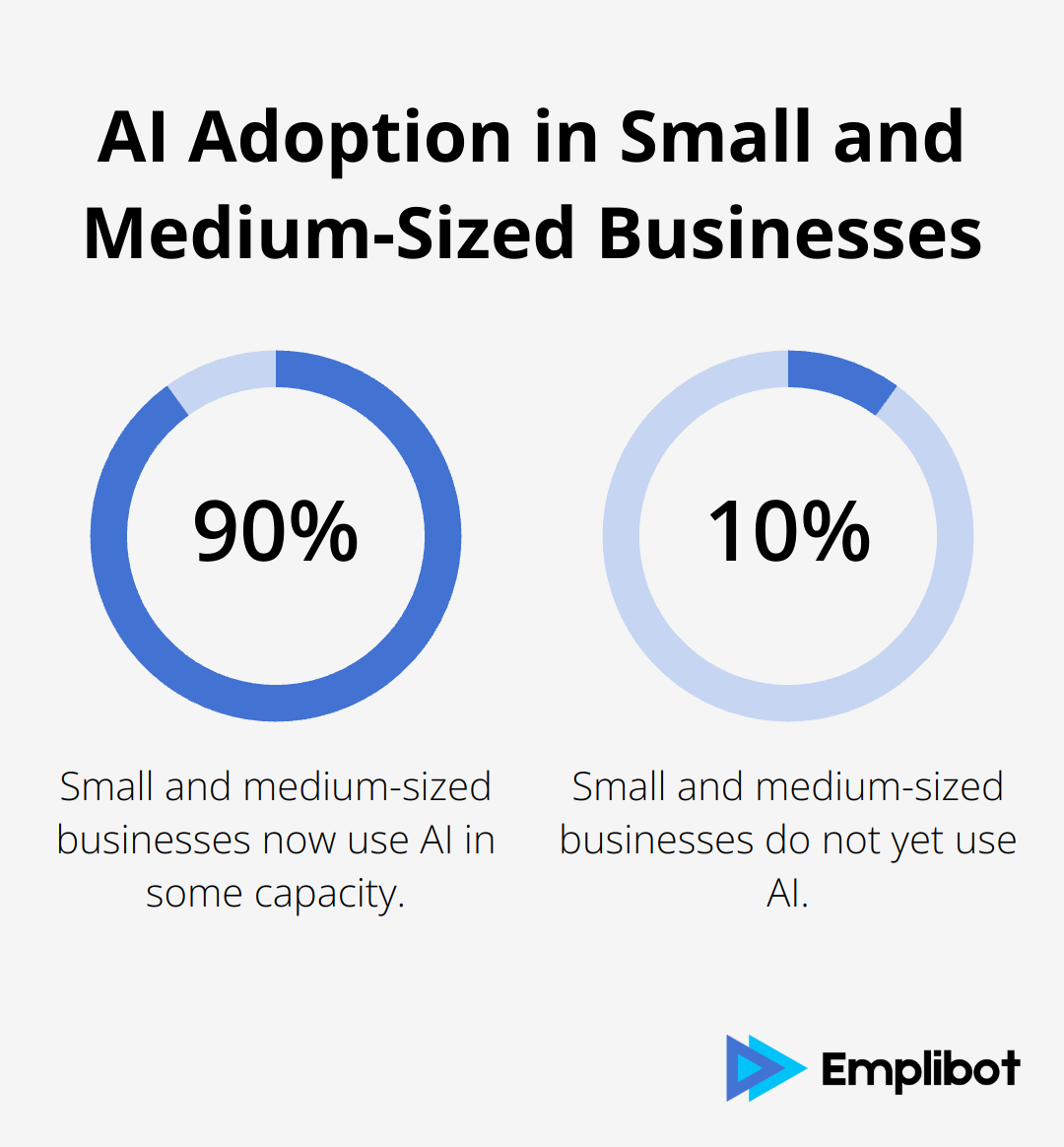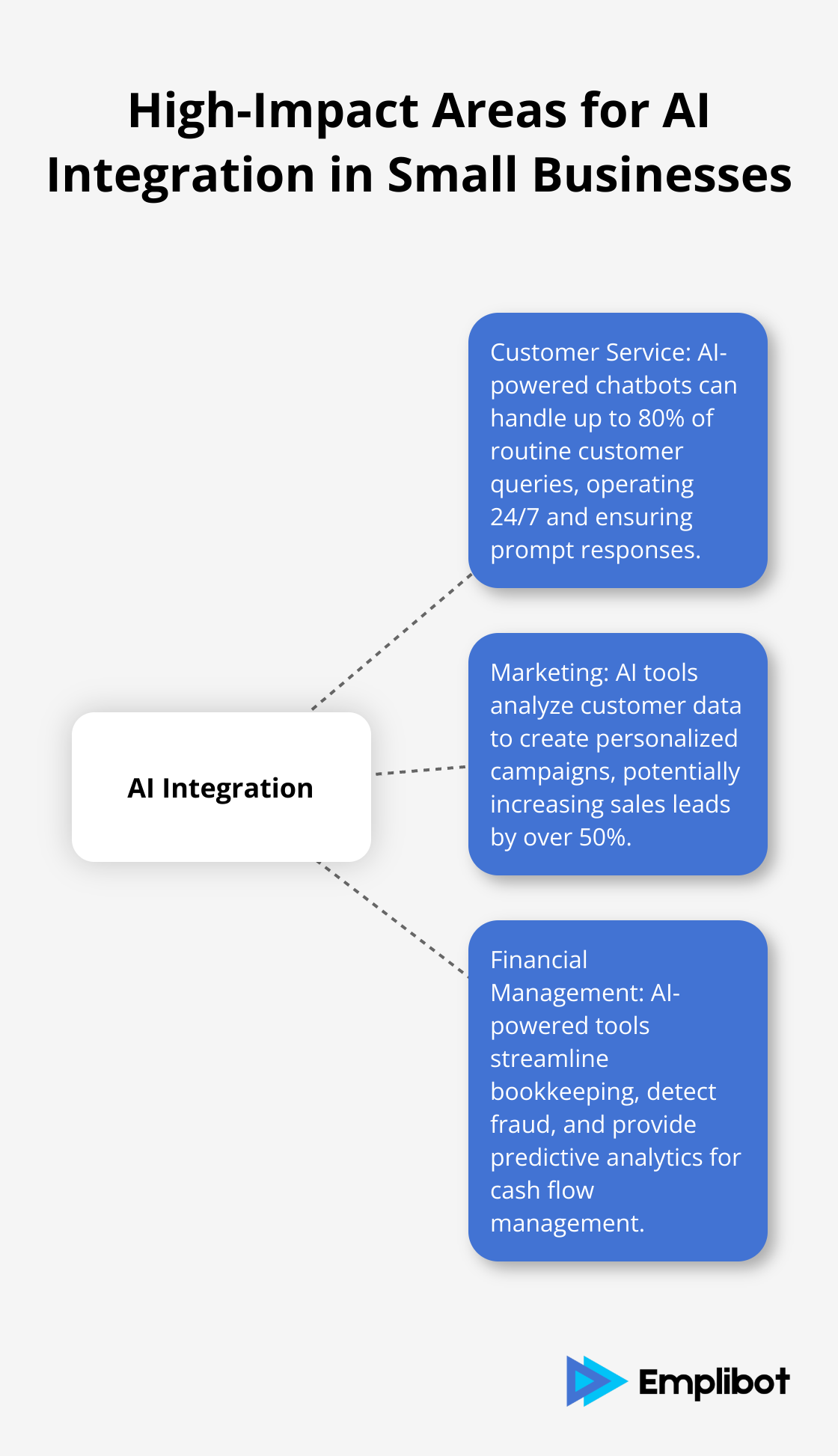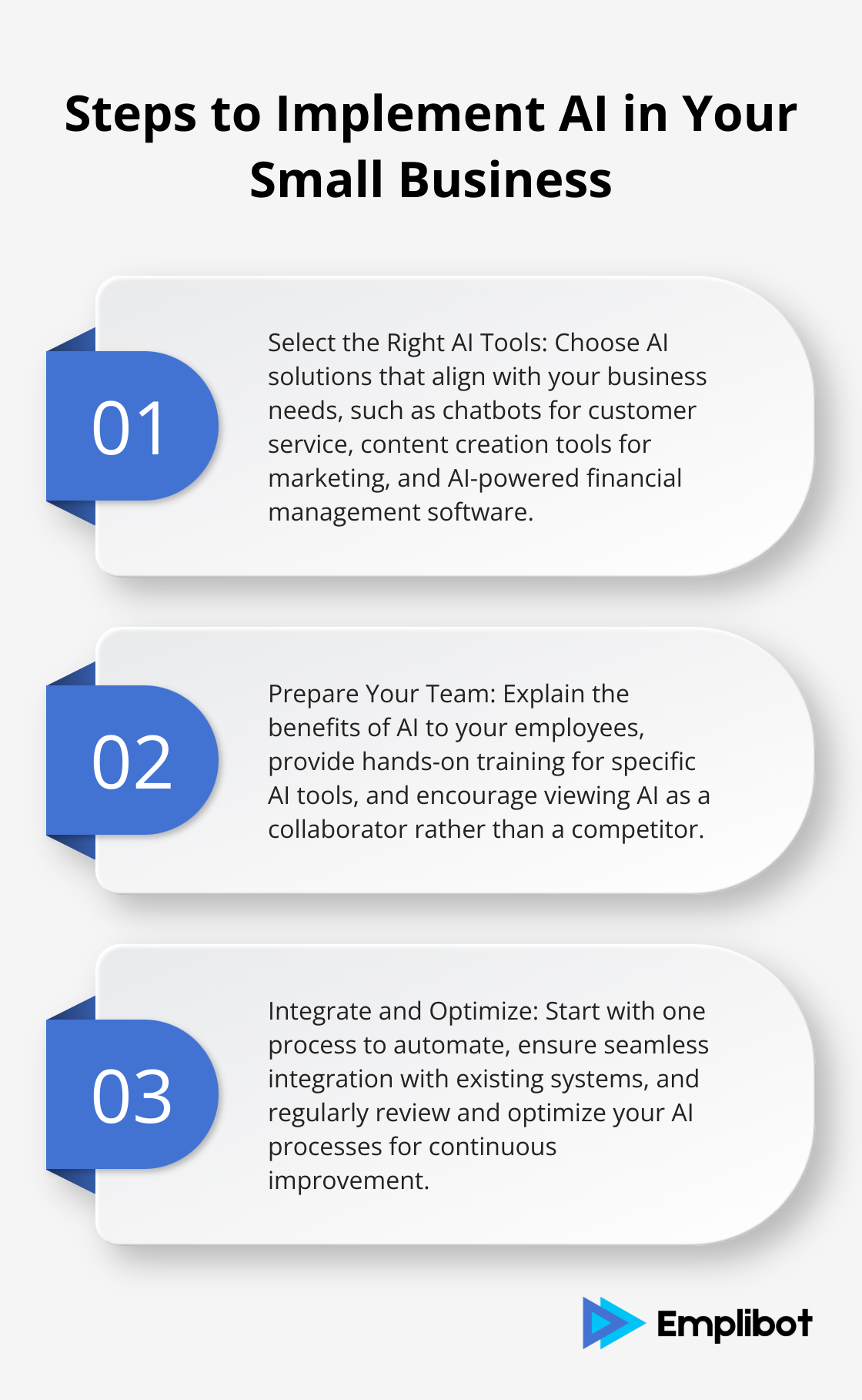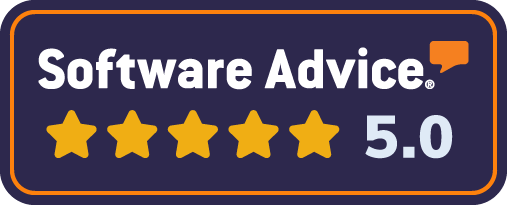AI solutions for small businesses are no longer a luxury reserved for large corporations. At Emplibot, we’ve seen firsthand how these technologies can revolutionize operations and drive growth for companies of all sizes.
This guide will show you how to harness the power of AI, from identifying opportunities to implementing practical solutions. We’ll demystify the process and provide actionable steps to help your small business thrive in the AI-driven landscape.
Contents
ToggleWhat Is AI and Why Does It Matter for Small Businesses?
Defining AI for Small Business Owners
Artificial Intelligence (AI) revolutionizes small business operations, providing powerful tools once exclusive to large corporations. AI systems perform tasks that typically require human intelligence. These systems learn, reason, and self-correct, making them invaluable for businesses aiming to streamline operations and boost productivity.
The Real-World Impact of AI on Small Businesses
Small businesses increasingly turn to AI to gain a competitive edge. A recent Salesforce survey reveals that 90% of small and medium-sized businesses now use AI in some capacity. This high adoption rate proves AI is not a futuristic concept but a present-day reality for many entrepreneurs.

One significant advantage of AI for small businesses is its task automation capability. AI-powered chatbots provide immediate responses to customer inquiries, significantly reducing wait times. They can handle multiple queries simultaneously, ensuring efficient customer service. A Harvard Business Review study found that companies using AI for customer service increased their sales leads by over 50% while significantly reducing call times.
Debunking AI Myths for Small Business Owners
Despite growing adoption, misconceptions about AI implementation persist. Many small business owners believe AI is too expensive or complex for their operations. However, numerous affordable and user-friendly AI tools exist specifically for small businesses.
Another common myth suggests AI will replace human workers. While AI automates certain tasks, it often enhances human capabilities rather than replacing them entirely. In fact, AI-powered automation can increase productivity by up to 40%, giving small businesses a significant competitive edge.
Practical AI Applications for Small Businesses
AI applies to various aspects of a small business. In marketing, AI tools analyze customer data to create personalized campaigns, potentially increasing conversion rates. A recent study shows that 47% of marketers in small businesses now rely on AI for ad targeting, resulting in improved ROI.
For financial management, AI-powered tools streamline bookkeeping, detect fraud, and provide predictive analytics for cash flow. This level of insight was previously only available to larger companies with dedicated financial teams.
In customer service, AI chatbots increase customer retention rates by 20% for businesses that implement them. These chatbots handle routine inquiries, schedule appointments, and even process simple transactions, all while providing instant responses to customers.
The Future of AI in Small Business Operations
As AI technology continues to evolve, its applications for small businesses will expand. From predictive analytics to advanced automation, AI promises to level the playing field between small businesses and larger competitors. The next chapter will explore how to identify specific AI opportunities within your small business, ensuring you maximize the potential of this transformative technology.
Where Can AI Boost Your Small Business?
Evaluating Your Current Processes
Small businesses must examine their daily operations to identify AI opportunities. Tasks that are repetitive, time-consuming, or prone to human error are prime candidates for AI automation. For example, if your team spends hours each week scheduling appointments or responding to basic customer inquiries, an AI virtual assistant could handle these tasks efficiently.
Salesforce data reveals that 76% of small business owners report AI enables them to focus on higher-value tasks, increasing overall productivity. This shift allows you and your team to dedicate more time to strategic planning and creative problem-solving.
High-Impact Areas for AI Integration
Customer Service
AI-powered chatbots can handle up to 80% of routine customer queries, freeing up human staff for more complex issues. These chatbots operate 24/7, ensuring customers always receive prompt responses.
Marketing
AI tools analyze customer data to create personalized marketing campaigns, potentially increasing conversion rates. A Harvard Business Review study found that companies using AI for customer service increased their sales leads by over 50%.
Financial Management
AI-powered tools streamline bookkeeping, detect fraud, and provide predictive analytics for cash flow. This level of insight was previously only available to larger companies with dedicated financial teams.

Conducting an AI Readiness Assessment
To determine your business’s readiness for AI adoption, use an AI readiness assessment tool. These tools evaluate your current processes, technology infrastructure, and team skills to identify areas where AI can be most effectively implemented.
The U.S. Chamber of Commerce offers a free AI readiness assessment tool specifically designed for small businesses. This assessment helps you understand your current AI capabilities and provides recommendations for improvement.
Additionally, consulting with AI experts or attending industry workshops can provide valuable insights into how AI can benefit your specific business model. Many AI solution providers offer free consultations to help you identify the most impactful AI opportunities for your business.
Prioritizing AI Initiatives
After identifying potential AI opportunities, prioritize them based on their potential impact and ease of implementation. Start with projects that offer quick wins and demonstrable ROI. This approach allows you to build momentum and gain support for more extensive AI initiatives in the future.
For example, implementing an AI-powered content creation tool (such as Emplibot) can quickly boost your marketing efforts without requiring significant changes to your existing workflows. Such tools can generate high-quality, SEO-optimized content tailored to your business, saving time and resources while increasing your online visibility.
Now that you’ve identified where AI can boost your small business, it’s time to take action. The next chapter will guide you through the practical steps to implement these AI solutions effectively.
How to Implement AI in Your Small Business
Select the Right AI Tools
The first step is to choose AI tools that align with your business needs. For customer service, consider AI chatbots like Intercom or Drift. These platforms can handle high volumes of routine inquiries without requiring additional staff, freeing up your team for more complex issues.
For content creation and marketing, Emplibot stands out as the top choice. It automates your entire content marketing process, from keyword research to content creation and distribution across social media platforms. This comprehensive solution can significantly boost your online presence and lead generation efforts.
In financial management, tools like QuickBooks AI or Xero’s AI features can streamline your bookkeeping and provide valuable insights into your cash flow. AI-powered solutions can improve financial processes and help organizations outperform their peers.
Prepare Your Team
Successful AI implementation requires buy-in from your team. Start by explaining the benefits of AI – how it will make their jobs easier, not replace them. A survey by IBM shows that 64% of employees believe AI will help them have a more fulfilling work experience.
Provide hands-on training for the specific AI tools you’re implementing. Many AI providers offer free training resources. Set realistic expectations. AI isn’t magic – it’s a tool that needs human oversight. Encourage your team to view AI as a collaborator rather than a competitor.
Integrate and Optimize
Choose one process to automate with AI and perfect it before moving on to others. This approach allows you to iron out any kinks and build confidence in the technology.
Ensure your AI tools integrate well with your existing systems. Most modern AI solutions offer APIs for seamless integration. If you use WordPress for your website, some AI tools integrate directly, which makes content creation and publishing effortless.
Review and optimize your AI processes regularly. AI learns and improves over time, so what works today might be even better tomorrow. Set up regular check-ins to assess the performance of your AI tools and make necessary adjustments.

Measure Your Success
To justify your AI investment, you need to measure its impact. Set clear KPIs before implementation. For a customer service chatbot, this might be response times or customer satisfaction scores. For content marketing AI, track metrics like website traffic, engagement rates, and lead generation.
Use A/B testing to compare AI-driven processes with manual ones. This approach can provide concrete evidence of AI’s impact. For example, compare the performance of AI-generated content against manually created content.
Keep track of time saved and efficiency gains to calculate your ROI.
Implementing AI is an ongoing process. As your business grows and evolves, so too should your AI strategy. Stay informed about new AI developments and be ready to adapt your approach as needed.
Final Thoughts
AI solutions for small businesses transform operations and provide a competitive edge. Small business owners must choose the right tools, prepare their teams, and integrate AI seamlessly into existing workflows. These steps will address challenges such as initial resistance and integration issues, fostering a culture of innovation.
The future of AI in small businesses promises more sophisticated and accessible solutions. Advanced predictive analytics and human-like chatbots will continue to level the playing field between small businesses and larger corporations. AI technologies will evolve to offer even more tailored solutions for small businesses.
Emplibot stands out as a powerful AI solution for small businesses. It automates the entire content marketing process, from keyword research to content creation and distribution. Small businesses can boost their online presence, generate leads, and drive sales without a large marketing team or budget.


![AI Marketing: Lead Generation [Guide]](https://wp.emplibot.com/wp-content/uploads/emplibot/ai-marketing-lead-generation-1753859292-768x456.jpeg)
![AI Marketing: Predictive Lead Scoring [Guide]](https://wp.emplibot.com/wp-content/uploads/emplibot/predictive-lead-scoring-1753772819-768x456.jpeg)

![Google Autocomplete for Keyword Research [Guide]](https://wp.emplibot.com/wp-content/uploads/emplibot/google-autocomplete-for-keyword-research-1753600089-768x456.jpeg)




